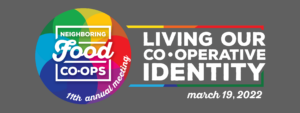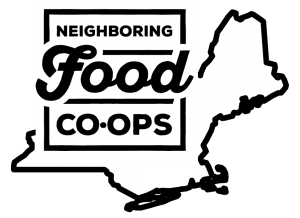
Your Neighboring Food Co-ops
Locally Owned by More Than
164,000 People Like You!
- Frederick Douglass and Co-ops in 1846
- New Partnership with the Federation of Southern Cooperatives
- Shared Capital Cooperative: Putting Capital at the Service of People
- Co-operative Identity Advisory Group
- Simply Voting: Providing Secure Hosted Online Elections
- February’s Cave to Co-op Artisan Cheese
- Love Your Farmer, Love Your Blueberries
- Co-op Jobs
- Farmers Union: Northeast Dairy Task Force Recommendations
- Co-op Calendar
Frederick Douglass and Co-ops in 1846
By David J Thompson. NCB Blog, February 3, 2022
Frederick Douglass drew himself up to his height of just over 6 feet, looked out over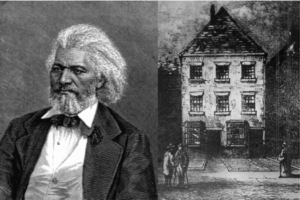 the packed audience of over 1,000 – mostly millworkers – and vociferously and eloquently described his life as a slave in the United States of America. It was October 10th, 1846, and Douglass had just been warmly introduced by John Bright, a British Member of Parliament. Even at a young age, Bright had already emerged as one of the most powerful speakers in Britain against slavery. There was a sold-out house in the Public Room on Baillie Street in Rochdale, Lancashire, England.
the packed audience of over 1,000 – mostly millworkers – and vociferously and eloquently described his life as a slave in the United States of America. It was October 10th, 1846, and Douglass had just been warmly introduced by John Bright, a British Member of Parliament. Even at a young age, Bright had already emerged as one of the most powerful speakers in Britain against slavery. There was a sold-out house in the Public Room on Baillie Street in Rochdale, Lancashire, England.
Douglass used his time to educate the engaged Rochdale audience about his life as a slave and slavery itself in the United States. Douglass spoke at the Public Hall in Rochdale in 1846, five times between October 10 and 14, and twice more on November 10 and 11. On October 12, Douglass returned to Manchester to speak to 4,000 people at the Free Trade Hall, and then returned to Rochdale.
Frederick Douglass was 28-years-old and had just published his first book: “Narrative of the life of Frederick Douglass, An American Slave.” Because the book was an instant best seller in the U.S., and because the press identified the public places where Douglass spoke, Douglass was at grave risk of immediate arrest as a fugitive slave.
Douglas had fled to Britain because his owner in Maryland, Thomas Auld, had announced that he intended to capture Douglass and return him to forced slavery. William Lloyd Garrison, the leading American Abolitionist, had accompanied Douglass to Rochdale, and also spoke at each of the October meetings.
Surely among the audience at the Public Hall in Rochdale that night and during the other speeches that Douglass gave that week in Rochdale, were some of the founders of the first modern co-op. The tiny store opened by the Rochdale Pioneers at 31 Toad Lane was about a three-minute walk away from the Public Room on Baillie Street. All of the original 28 members of the Rochdale Equitable Pioneers Society were heavily engaged in the social and political change of that era. Every Sunday, many of Rochdale’s co-op founders and members attended the non-conformist churches, such as Methodist, Unitarian, and Baptist chapels. Here, they would have heard sermons on the evils of slavery. These local activists had started the Co-op in 1844, to change their daily circumstances. Every day at work in the mills or walking on its streets, the Rochdale Pioneers were recruiting other millworkers to join their co-op.
John Bright was an early supporter of the ‘self-help’ philosophy of the Rochdale Pioneers and occasionally spoke in Parliament about the accomplishments of his local Co-op. Bright supported changes in the law that gave co-operatives greater financial power. Additionally, Bright spoke highly of the co-ops’ ability to be democratic while running a business. Bright noted in his 1854 diary that he was to visit the co-op to check on its progress. Bright used the example of the Rochdale Equitable Pioneers Society to sway other members of parliament in favor of extending the vote to working men.
Bright’s’ brother, Jacob Bright, was also a strong supporter of co-operatives. In the 1850s he was appointed as an arbitrator of the Co-operative Manufacturing Society and the co-operatively run Corn Mill. Subsequently, Jacob Bright became the first elected Mayor of Rochdale.
During his almost three-year stay in Britain (1845-1847), Douglass gave roughly 300 public speeches in many different towns and cities in Britain. Many of his speaking engagements and stays were hosted by a strong network of Quakers, John Bright, being one of them. Bright had arranged for Douglass to speak in Rochdale on seven different occasions in 1846 alone. Douglass was also a regular guest at “One Ash,” the Rochdale home of John Bright and his family. In “The Life and Times of Frederick Douglass,” page 235, Douglass writes about his first visit to England (1845-1847), “I was, besides, a welcome guest at the home of Mr. Bright in Rochdale and treated as a friend and brother among his brothers and sisters.”
Beginning in August of 1846, Ellen Richardson, a Newcastle Quaker, engaged in raising funds from her circle of Quakers to buy Frederick Douglass out of slavery. As a result of Douglass’ stay with John Bright in Rochdale, Bright immediately contributed one-third of the money needed to purchase Douglass from his American slaveholder. In October of 1846, Douglass arrived in Rochdale a fugitive slave. With Bright’s large contribution, however, Douglass left Rochdale about to become a free man. Ellen Richardson wrote that with the generous gift from Bright, they were certainly going to have the funds they needed to buy Douglass’s freedom from slavery.
By December 1846, Bright and the other Quakers learned that the sale was almost complete. Towards the middle of December, Frederick Douglass learned by steamship mail that as of December 12, 1846, Douglass was no longer legally a slave in the USA, and his papers of manumission had been confirmed.
On December 22nd, 1846 Douglass wrote a reply to a letter written on December 12th by Henry C Wright. Wright was a fellow abolitionist who occasionally spoke on the same platform as Douglass. Douglass was cautious about being allied with him as Wright was a fiery speaker with more radical views than Douglass. Wright had written to Douglass severely critiquing him for allowing people to buy him as a slave.
From the content of each of the letters, it is evident that both Wright and Douglass know that Douglass is being freed. At the time, Douglass was staying twelve miles away from Rochdale at 22 St Ann’s Square, Manchester.
Frederick Douglass remarked on March 30, 1847, at a farewell banquet at the London Tavern in London:
“I do not go back to America to sit still, remain quiet, and enjoy ease and comfort. . . I glory in the conflict that I may hereafter exult in the victory. I know that victory is certain. I go, turning my back upon the ease, comfort, and respectability which I might maintain even here. . . Still, I will go back, for the sake of my brethren. I go to suffer with them; to toil with them; to endure insult with them; to undergo outrage with them; to lift up my voice in their behalf; to speak and write in their vindication; and struggle in their ranks for the emancipation which shall yet be achieved.”
In his conclusion, Douglass states; “I came here a slave, but I go back free.”
On April 2, 1847, Douglass stayed with John Bright in Rochdale the day before he sailed from Liverpool back to America finally a free man.
He sailed early Sunday, April 4. Booker T. Washington wrote of the stay of Douglass as the guest of John Bright and his sisters. “From no one in England could Douglass have received a more gracious welcome and friendly benediction than from this great commoner.” (“Frederick Douglass: A Biography by Booker T. Washington,” (p 65). Originally published: Philadelphia: G.W. Jacobs, 1906.)
Douglass landed in Boston and arrived home in Lynn, MA in the spring of 1847.
The linking of Frederick Douglass, John Bright, Rochdale, and the first modern co-op began in 1846. The link between co-operatives and the campaigns against slavery, and for civil rights continues strongly to this very day and for eons to come.
This linkage can be divided into two different eras;
1. Anti-Slavery and Co-ops
Frederick Douglass’ sojourn in Britain in 1845-1847, occurred during the same years that consumer and worker co-operatives were being born all over Britain. The Chartist movement might have been stalled by Parliament, but the struggle for local democratic and social change carried on in the form of co-operatives. Many of the British Chartist leaders who welcomed Douglass to speak were also engaged in building different types of co-operatives. Due to their strong interest in building democratically owned local institutions, many co-operatives emerged in the same towns where Douglass spoke.
Not only did Douglass speak in Rochdale, the English cradle of the co-operative movement, but Douglass had also spoken earlier in Fenwick, on April 6, 1846. Fenwick is the Scottish birthplace of the Fenwick Weavers (1761-1839), an earlier model of co-operatives. It was an era of societal change which sought democracy and abhorred slavery of any kind. The audiences that came to hear Douglass wanted to build the same slavery-free world that Douglass spoke of. The fledgling co-operative movement was an ardent activist in the British fight against slavery everywhere. In the West Indies, the last bastion of British Slavery did not end until 1838.
While in Britain, Douglass was introduced to other efforts to obtain democratic rights. The British Chartist leader, the Irish born Feargus O’Connor led the actions to create co-operative land societies. Members would buy shares in a land co-operative that would use the combined funds to buy land and then by lottery allocate parcels of the land to the members. The intent was to create a parcel of land of the value that would give the member the right to vote. Thousands of democratic activists bought shares in these Chartist Co-operative Land Companies and a number of the Rochdale Pioneers were among them.
Since Douglass spoke, on occasion, on the same platform as O’Connor during his stay in Britain, Douglass would have learned of the Chartists’ property path to democracy. Douglass also often spoke on the same platform as William Lovett and Henry Herrington, and many of these Chartists later played a role in evangelizing about working people needing to start co-operatives. There is a possibility that Douglass may have visited one of the Chartist colonies (Heronsgate?) to see how the parceling of property had created a number of voting free-holders.
John Bright was the first president of the similar efforts of the Rochdale Freehold Society. In 1850, the society bought 24 acres of land in Rochdale which was then divided up into 500 pieces of land for houses that would create over time 500 new voters in the town. There is an area of Rochdale today still called Freehold centered on Freehold Street. Extending the vote to the middle and working classes would energize new political parties that would later change the face of British politics.
During his lengthy sojourn in Britain, (1845-47) when in London, Douglass sometimes stayed at the Reform Club on Piccadilly as a guest of John Bright.
There is a second possibility of Frederick Douglass and Charles Howarth, (one of the original 28 founders of the Rochdale Pioneers and its second President) being in the same room at the same time. It is documented separately that in 1847, Douglass and Howarth were each in the House of Commons in the “Strangers Gallery” (a balcony with three narrow rows of seating for guests and visitors) to hear John Bright speak on the Ten Hours Bill. What has not been possible to confirm if it was on the same date?
2. Chronology of Support for the US North in the Civil War (1861-65): The Role of Douglass, Bright, Rochdale, and Co-operatives
- Frederick Douglass had a long and strong friendship with John Brown that began in Brown’s home in Springfield, MA, in 1847. In 1858, Brown stayed with Douglass at his home in Rochester, NY, and asked Douglass to take part in the attack at Harpers Ferry. In August of 1859, Douglass met secretly with Brown at a quarry near Chambersburg, PA, to discuss the details of the raid. At that meeting, Douglass told Brown he would not participate.
- Douglass was giving a talk when he heard that the Harper’s Ferry Raid had begun. Douglass immediately fled to England in fear of being arrested as a John Brown accomplice. Douglass arrived in Liverpool on November 24th, 1859 and spent Christmas and January with Julia Crofts (nee Griffiths) and stayed in Britain (leaving from Liverpool on April l 1860) until he was assured that his relationship to Brown was no longer cause for his arrest. (Frederick Douglass Encyclopedia, p60)
- When the Civil War broke out in 1861, the bottom fell out of the cotton market at the Manchester Exchange. Soon hundreds of cotton manufacturers in Lancashire either closed down or substantially reduced production. Sixty percent of the mills were idle. Thousands of cotton factory workers were laid off and they and their families faced new levels of poverty and starvation.
- During the 1860s, the Rochdale Observer newspaper actively opposed slavery. The paper printed numerous letters from Rochdale millworkers who had immigrated to the USA to escape the unemployment caused by the Civil War. Those letters urged the people of Rochdale to keep up their support by describing the slavery they had seen and learned about in the USA. The Rochdale and other British cooperators who had arrived in the USA immediately organized consumer co-ops in the mill towns of the US North East. A co-op in the town of Lawrence, MA, is a good example of the activist impact of mill worker immigrants from Rochdale. The American co-ops started by British immigrants from the mill towns of the US North East also took strong action against slavery.
- In 1863, to honor the efforts of those Americans who fought against slavery and supported the North against the South during the Civil War, the Co-operative Wholesale Society (CWS) in Manchester adopted their motto as “Labor and Wait” spelling Labor in the American style. In addition, the CWS leaders renamed their annual meeting their ‘Congress’ and the chairman of ‘Congress’ was renamed President. Over 160 years later, the annual meeting of British co-ops is still called ‘Congress’ in honor of those who fought slavery.
- Lincoln kept a framed photo of John Bright in his office in the White House. It was the only photo on display.
- After Lincoln was shot, historians looked at what was in his pockets. One item Lincoln had was a clipping of John Bright urging people to vote for Lincoln.
- In Britain, Manchester was the heart of the fight against the South and slavery and the Union and Emancipation Society was the leading voice and critical organizer of British anti-slavery opinion during the US Civil War. The largest indoor- attended anti-slavery meetings in Britain were held at the Free Trade Hall in Manchester. Douglass had spoken eight times at the Free Trade Hall and other Manchester locations in 1846 and 1847, and once in 1860.
- J. C. Edwards and E. O. Greening were the hard-working, unpaid ‘Honorable Secretaries’ of the Union and Emancipation Society, Britain’s most powerful organization against slavery and in favor of the North. Edwards and Greening were also both elected board members and officers of the Co-operative Wholesale Society. Thomas Bayley Potter, the Chairman of the Union and Emancipation Society, was Member of Parliament for Rochdale from 1865-1895. In 1891, his niece, Beatrice Potter wrote, “The Co-operative Movement in Britain.”
- There is a statue of Abraham Lincoln in Manchester – one of only a few in Britain. On the plinth is Lincoln’s personal letter of January 13, 1863, addressed to “The Workingmen of Manchester.”
- The Touchstones Museum in Rochdale has the only remaining barrel of those sent to Liverpool in 1863, on the SS Griswold, where 15,000 barrels of flour were sent by sympathetic Americans to feed people in Lancashire hungry from the vast unemployment caused by the Cotton Famine.
- During the Cotton Famine, The Rochdale co-op used its meeting and reading rooms for classes to increase the educational capacity of the members who were unemployed.
- In late 1862, along with other Northern towns, thousands of inhabitants of Rochdale personally signed a petition asking Lincoln to free all slaves in the USA. That petition is in the collection of the Library of Congress in Washington, DC. Hundreds of co-op members from Rochdale will have signed the petition. By 1865, there were 5,326 members of the Rochdale co-op.
- When the Rochdale Pioneers opened their new main store on September 28, 1867, they invited English-born Richard Hinton to speak at the ceremony. Hinton was an avid enemy of slavery and a close friend and associate of John Brown. Hinton had reached the rank of Colonel in command of Colored Regiments and was also Acting Inspector General of the Freedman’s Bureau during the Civil War.
In front of the City Hall at Manchester facing the building are two large statues of Abel Heywood and John Bright. They are both prominently placed equidistant from the Albert Memorial centerpiece. Both of these reformist leaders spoke out vociferously against slavery and both of them urged working people to join co-operatives.
In 1863, 300 Lancashire and Yorkshire co-operatives banded together to form the North of England Co-operative Society. In 1872, that society changed its name to the Co-operative Wholesale Society and in 2001, the name was changed again to its present-day name, The Co-operative Group. No matter the name, from 1863 forward to this very day, Manchester has been the commercial and administrative center of the British Co-operative Movement.
Co-operatives have always been linked with efforts to build a better and inclusive world. The ties started in 1846, between Frederick Douglass, John Bright, Rochdale, and Co-operatives that paved the way for a very special road. Co-operators today continue that work in Britain, the USA, and all around the world. What a great start we were given.
© David J Thompson 2021
This article was written for the National Co-operative Bank at the request of Chuck Snyder, CEO.
New Partnership with the Federation of Southern Cooperatives
New partnership between the Federation of Southern Cooperatives and the Neighboring Food Co-op Association is centered around an equitable marketing relationship between black farmer co-ops in the Southeast and food co-ops in the Northeast, but is evolving to focus on co-operative development, policy advocacy, and working together to build racial and economic justice.
“What if the residents of communities truly owned the economic base and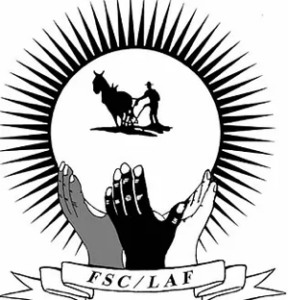 infrastructure of their communities?
infrastructure of their communities?
Well, ‘what if’ is definitely possible. Because what we’re talking about are co-operatives.”
That was Cornelius Blanding, Executive Director of the Federation of Southern Cooperatives / Land Assistance Fund, speaking at the Neighboring Food Co-op Association (NFCA) 2017 Annual Meeting. Blanding’s keynote was part of the NFCA’s efforts to engage our members in a broader dialog on the history of co-ops in the struggle for Civil Rights in the U.S., and to consider the potential for building greater racial and economic justice through partnership among our associations.
More recently, the Federation and the NFCA signed an agreement exploring trade relationships between Black-led co-ops in the U.S. South and food co-ops in the Northeast, expanding co-op education and training, growing awareness of the role of co-ops and their associations in the struggle for social justice, and collaboration on policy advocacy. This fall, the organizations collaborated on co-op business trainings with the International Centre for Co-operative Management at Saint Mary’s University and presented a panel on co-operative associations at the NOFA/Mass Winter Conference (recording here). And later this spring, they will be surveying food co-ops in the Northeast on the potential for purchasing products from Black-led producer co-ops in the South as part of a grant secured in partnership with the Cooperative Development Foundation (CDF).
Formed out of the Civil Rights movement, the Federation was established in 1967 to create rural community-based economic development opportunities throughout the rural South for black farmers, landowners, and low-income communities via co-operatives. Today, the Federation is a co-operative association of black farmers, landowners, and co-ops and credit unions across Georgia, Mississippi, Alabama, Florida, South Carolina, and Louisiana. Organized in state associations, Federation field offices serve members through education and training, technical assistance, and policy advocacy.
For more information on the Federation of Federation of Southern Cooperatives / Land Assistance Fund, visit https://Federation.Coop.
Shared Capital Cooperative: Putting Capital at the Service of People
We put capital at the service of people rather than the other way around.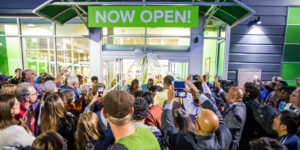
Shared Capital Cooperative was founded more than 40 years ago by five food co-ops who took their money out of the banks who wouldn’t provide them with loans and decided to pool it in a mutual aid revolving loan fund. From those original co-ops who pooled $4,500, Shared Capital has grown into a $20 million fund representing co-operatives of all types throughout the US. Co-ops and individuals are invited to be members of Shared Capital and consider investment, putting our shared resources to work for shared impact.
Our co-operative of co-ops is enduring proof that democratically run businesses can be engines of economic opportunity—for all.
With a mission to build a just, equitable and democratic economy by investing in co-operative enterprises Shared Capital has made more than 900 loans to co-operatives totaling over $55 million dollars since 1979.
Like the Neighboring Food Co-op Association (NFCA), Shared Capital is organized as a co-operative of co-operatives, owned by nearly 300 co-ops who invest in and borrow from the fund. Our priority is meeting the capital needs of our members. We take innovative and creative approaches to how we finance co-operatives and to how we manage and govern our loan fund by embedding democracy, equity and justice throughout our work. Shared Capital’s board of directors is nominated and elected by the members, including the NFCA and many of NFCA’s member food co-ops.
Executive Director, Christina Jennings, notes that Shared Capital’s structure creates “creative tension” because its members want to invest in other co-operatives—especially those who have been excluded from access to capital from other sources. Yet, at the same time, the members want to be sure their own savings will be there when they need it. Shared Capital’s job is to balance and manage those risks and opportunities.
We invest in co-operatives who are addressing enduring challenges in their communities.
Shared Capital provides financing from $5,000 to $1,000,000 to co-operatively owned small businesses and affordable housing co-operatives, ranging from a driver-owned app-based ride share in NYC to a co-operative home care agency in rural Wisconsin to an affordable housing community in Indianapolis.
“The best thing about Shared Capital is that they come into the process with a desire to make things work,” says Cornelius Blanding, Executive Director of the Federation of Southern Cooperatives / Land Assistance Fund. “Shared Capital is a co-operative, so their approach is basically, ‘How do we make this work for our members?’”
Shared Capital is committed to investing in communities that have been historically excluded from access to capital. Over 80% of our financing goes to co-operatives organized and owned by Black, Indigenous and People of Color, LGBTQ people, women and members of low-resource households who transform the capital into myriad community impacts.
“Mutual self-help is at the heart of the co-operative movement, and by leveraging our collective resources we can support shared growth, innovation and success,” said Erbin Crowell, NFCA Executive Director. “We’re excited to partner with Shared Capital with the goal of increasing access to capital for food co-ops in the Northeast, building on shared partnerships with organizations like the Federation of Southern Cooperatives, and growing a more inclusive economy that works for everyone.”
For more information on Shared Capital Cooperative, please visit https://SharedCapital.Coop.
Co-operative Identity Advisory Group
Neighboring Food Co-op Association Executive Director Erbin Crowell joins International Co-operative Alliance advisory group considering relevance of the Co-operative Identity to the challenges of our time.
Erbin Crowell, Executive Director of the Neighboring Food Co-op Association (NFCA), has been appointed to an advisory group of the International Cooperative Alliance (ICA) that is addressing the global dialog on the Co-operative Identity. The appointment is related to Crowell’s service on the Board of DotCooperation, an organization owned by the ICA and the National Cooperative Business Association (NCBA) that works to unite the international co-operative community through a shared online identity and platform for communicating our difference, including .coop domain names, the Cooperative Marque, and the Global .Coop Directory.
has been appointed to an advisory group of the International Cooperative Alliance (ICA) that is addressing the global dialog on the Co-operative Identity. The appointment is related to Crowell’s service on the Board of DotCooperation, an organization owned by the ICA and the National Cooperative Business Association (NCBA) that works to unite the international co-operative community through a shared online identity and platform for communicating our difference, including .coop domain names, the Cooperative Marque, and the Global .Coop Directory.
At the World Cooperative Congress held in Seoul last December, the ICA decided to launch a review of the Co-operative Identity, which is comprised of the definition, values and principles that distinguish the co-operative movement and business model. This will be only the fourth review of the Co-operative Principles in the nearly 130-year of history of the Alliance, with the most recent version being approved at the ICA’s 100th Anniversary Congress in 1995. To support this work, an advisory group of 20 co-operators from around the world has been formed to offer feedback and guidance.
“It’s a great honor to be invited to be part of this global dialog,” said Crowell. “One of the things that is most inspiring about our movement is that we are constantly pushing ourselves to live up to our values, to be more relevant to the challenges and opportunities of our time. And this is a crucial time for us to come together for this important discussion around what co-operatives have to offer.”
Then ICA defines a co-operative as an “autonomous association of persons united voluntarily to meet their common economic, social and cultural needs and aspirations through a jointly-owned and democratically-controlled enterprise.” The movement is rooted in the values of self-help, self-responsibility, democracy, equality, equity, and solidarity.
Crowell has served as NFCA Executive Director since its incorporation in 2011. He received his Master of Management: Co-operatives & Credit Unions from Saint Mary’s University in Nova Scotia, and serves on the Boards of Directors of the National Cooperative Business Association and DotCooperation LLC.
Simply Voting: Providing Secure Hosted Online Elections
Simply Voting Inc. is a specialized provider of secure, hosted online elections.
Since 2003, Simply Voting has supported thousands of organizations in running millions of voting events across several industries and sectors – from universities, to labor unions, to professional membership associations, to corporations, to municipalities, and cooperatives across the spectrum. We have been proud partner of the Neighboring Food Co-op Association and its member cooperatives for several years, providing an online platform to assist in democratic endeavors.
millions of voting events across several industries and sectors – from universities, to labor unions, to professional membership associations, to corporations, to municipalities, and cooperatives across the spectrum. We have been proud partner of the Neighboring Food Co-op Association and its member cooperatives for several years, providing an online platform to assist in democratic endeavors.
Whether an organization is voting on revised by-laws or electing a governing board or a slate of officers, or anything in between, e-democracy and elections are often some of the most important activities an organization undertakes internally. Online voting helps organizations maintain up-to-date electronic contact information for their membership, increase member engagement and enfranchisement by allowing members to participate on their own terms, and reduces operating costs associated with election administration, without compromising security or auditability.
Successful cooperative elections typically incorporate four fundamentals of electoral legitimacy: inclusivity, transparency, accountability, and competitiveness. Ensuring that all stakeholders are involved in the process goes a long way towards building trust among all parties – whether that is a voter participating in an election, a candidate running in an election, or the staff administering an election. By incorporating these fundamentals, elections can withstand any tests to electoral legitimacy.
More than ever, agile cooperatives that adapt rather than run from an ever-increasing digital world, achieve their goal of providing value and serving their members in meaningful ways. And at Simply Voting, we are always ready to be an essential partner in helping cooperatives accomplish their missions.
As part of our partnership, NFCA Member Co-ops can receive a special discount on Simply Voting’s services. For more information, contact Suzette Snow-Cobb at suzette@nfca.coop.
February’s Cave to Co-op Artisan Cheese
Mt. Alice, von Trapp Farmstead, Waitsfield, VT.
Mt. Alice is an award-winning bloomy rind cheese made with pasteurized organic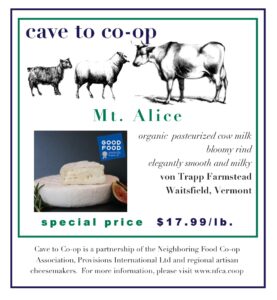 cow-milk at the von Trapp Farmstead in Waitsfield, Vermont. Mt Alice is named after a distinct mountain peak southeast of the farm. This Camembert-style cheese is an elegantly smooth, milky delight made from the farm’s cows’ milk and aged for three to five weeks. Mt. Alice is perfect on a cheese plate and makes a great easy lunch, thickly smeared on a crusty baguette.
cow-milk at the von Trapp Farmstead in Waitsfield, Vermont. Mt Alice is named after a distinct mountain peak southeast of the farm. This Camembert-style cheese is an elegantly smooth, milky delight made from the farm’s cows’ milk and aged for three to five weeks. Mt. Alice is perfect on a cheese plate and makes a great easy lunch, thickly smeared on a crusty baguette.
Since 1959, when Werner and Erika von Trapp purchased the von Trapp Farm, the farm has transitioned, over the course of three generations, to a certified organic dairy. In 2009 cheese making was added to the value-added operations. Striving for high-quality standards, the von Trapp Farm produces some of the sweetest organic milk for premium cheese production and have some of the happiest cows in Vermont.
If you are feeling adventurous, try this recipe which highlights Mt. Alice’s mushroomy and milky flavor.
Libritos de Lomo
- 4 3/4-inch-thick boneless pork loin chops
- Kosher salt and freshly ground black pepper
- 6 deli-thin slices black forest ham
- 3 ounces Mt Alice cheese, rind trimmed and cut into thin slices
- 4 piquillo peppers, cut open
- 1/4 cup all-purpose flour
- 1 large egg
- 1 cup panko (Japanese breadcrumbs)
- canola oil or other neutral oil for frying
1. Place each pork chop between large sheets of plastic wrap and pound with a meat mallet, heavy skillet, or rolling pin until ⅛ inch thick. Season both sides of each chop with salt and pepper. Place 1½ slices ham on each chop in a single layer to cover the surface, then layer the Mt Alice and piquillos on one half of each chop. Fold each chop in half like a book to enclose the cheese and piquillos.
2. Place the flour in a shallow dish, beat the egg in another, and spread the panko in a third. Carefully dredge all sides of the stuffed pork chops in the flour and shake off the excess. Then coat in the beaten egg and dredge in the panko. Tap off any excess crumbs.
3. Add enough oil to a large skillet to come ¼ inch up the sides. Heat over medium- high heat until hot. A panko crumb should sizzle immediately when dropped in. Add 2 breaded chops and cook, turning once, until golden brown, about 3 minutes per side. Drain on paper towels and season lightly with salt. Repeat with the remaining pork chops and serve immediately.
Each month our Cave to Co-op partnership between Provisions International and the Neighboring Food Co-op Association (NFCA) offers a delicious regional cheese featured at a great price. Strengthening our local and regional farmers and producers by supporting artisanal cheesemakers is a key goal of the Cave to Co-op program. For more recipes see our February Cave to Co-op page.
Love Your Farmer, Love Your Blueberries
Bringing Northeast grown fruits and vegetables to you through your co-op is a part of NFCA’s vision of a thriving co-operative economy, rooted in a healthy, just, and sustainable food system and a vibrant community of co-operative enterprise.
NFCA’s vision of a thriving co-operative economy, rooted in a healthy, just, and sustainable food system and a vibrant community of co-operative enterprise.
Your food co-ops works hard too to support our local farmers and love that they grow a variety of fruits and vegetables to offer shoppers.
Farmers are busy planning as we all anticipate the warmer weather and abundance of local fruits and vegetables available from the Northeast. But growing what we need isn’t easy. Farmers work hard, a labor of love, to grow what feeds us. While we wait for fresh blueberry season, we can enjoy northeast grown frozen blueberries supporting our local growers and our co-op!
Our Northeast Grown frozen blueberries are on sale at participating food co-ops beginning in March — a great time to stock up! Here is a favorite family recipe perfect for special celebrations or simple get-togethers with friends.
Kay’s Best Blueberry Pie
- 4 cups frozen NFCA blueberries
- 1 cup sugar
- 3 tablespoons cornstarch
- 1 tablespoon lemon juice
- 1 tablespoon sugar
- 1 cup heavy cream, whipped
- 1 tablespoon sugar
- 1 baked pie shell or a prepared crumb crust
Crush 2 cups of berries and blend with the sugar and cornstarch (which have been mixed together). Cook over direct heat, stirring frequently, until thick and smooth (8 to 10 minutes). Add the lemon juice. Cool. Then fold the remaining berries into the mixture.
Sprinkle the sugar over the bottom of the pie shell and add the filling. Chill in the refrigerator for 2 hours.
Top with the whip cream sweetened with the 1 tablespoon sugar.
For more Farm to Freezer information, visit www.nfca.coop/farmtofreezer.
When you work at your local food co-op, you’re part of something bigger: You’re also helping to grow a more healthy, just & sustainable food system that works for everyone!
Want to develop new skills, advance your career, and do meaningful work for a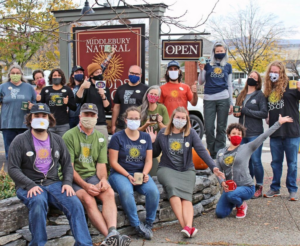 business that makes a difference in your community? Come join the co-op team!
business that makes a difference in your community? Come join the co-op team!
From our beginnings, co-ops have been guided by a commitment to shared values of democracy, equality, equity, and solidarity. And across our region, food co-ops have been pioneers in healthy food, sustainable agriculture, and building a more inclusive economy that works for everyone.
And working together, we are increasing our impact. Our food co-ops are locally owned by over 164,000 members, generate annual revenue of more than $382 million, and sell more than $100 million in local products. We also sustain good jobs in the community, employing 2,460 people – 65% of whom are also members, sharing in the ownership of their food co-ops.
Not only is working at your local co-op truly meaningful, it’s also fun working with others who also want to help build a better world. We’d love for you to be part of our co-op community and work to build a more healthy, just, and sustainable food system and a more inclusive economy.
Get more info and to help spread the word: https://nfca.coop/co-opjobs.
Farmers Union: Implement Northeast Dairy Task Force Recommendations
Pingree, Members of Northeastern Congressional Delegations Urge USDA to Implement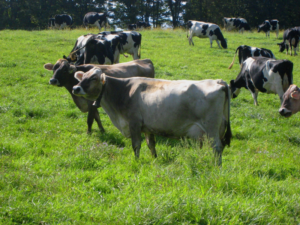 Northeast Dairy Task Force Recommendations.
Northeast Dairy Task Force Recommendations.
WASHINGTON, DC — Congresswoman Chellie Pingree (D-Maine) joined a group of lawmakers in urging the United States Department of Agriculture (USDA) to respond to the recommendations of the Northeast Dairy Task Force as quickly as possible. The Task Force was established in response to Danone’s announcement that it would terminate contracts with 89 organic dairy farms in the Northeast, leaving many of the region’s organic farms without a buyer and placing them at risk of closure. The Task Force issued numerous recommendations to improve organic dairy viability in the Northeast, many of which can be directly addressed through USDA support.
“When Danone/Horizon announced their intent to end their contracts with 89 organic dairy farms in the Northeast, 27 organizations came together to create the Northeast Dairy Task Force and provide recommendations to the U.S. Department of Agriculture (USDA) on ways to help the organic dairy industry. Despite the recent announcement that Danone will be providing further assistance to impacted farmers, the underlying structural threats to organic dairy in the Northeast remain and urgent action is needed,” the lawmakers wrote in a letter to USDA Secretary Tom Vilsack. The letter further asks that Secretary Vilsack respond to the Task Force without delay and to fully utilize existing USDA resources, initiatives, and authorities to implement the Task Force’s recommendations.
Pingree was joined by fellow members of Maine’s Congressional Delegation, Sens. Susan Collins (R), Angus King (I), and Rep. Jared Golden (D-ME-02), as well as Senators Patrick Leahy (D-Vt.), Bernie Sanders (I-Vt.), and Kirsten Gillibrand (D-N.Y.), and Reps. Annie Kuster (D-N.H.) and Elise Stefanik (R-N.Y.).
Click here to read the full text of the letter.
Take Action: Your food co-op can also take action by signing on to the Northeast Organic Family Farm Partnership as a retailer partner and encouraging your members and shoppers to sign the pledge to increase their purchases of regionally-produced organic dairy products. For more information, e-mail Suzette at Suzette@nfca.coop.
For More Co-op Events, Visit https://nfca.coop/calendar
The Neighboring Food Co-op Association (NFCA) is a co-operative federation of over 40 food co-ops and startup initiatives across New England, working together toward a shared vision of a thriving co-operative economy, rooted in a healthy, just, and sustainable food system and a vibrant community of co-operative enterprise.


